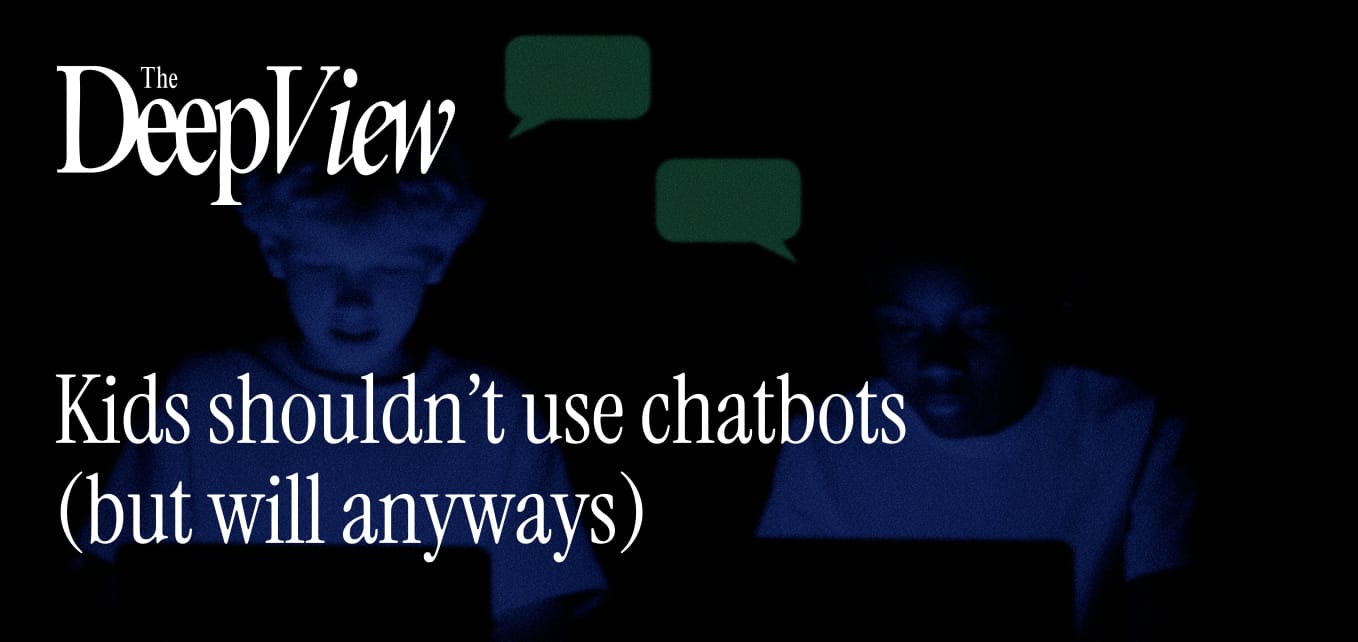- The Deep View
- Posts
- Kids shouldn’t use chatbots (but will anyways)
Kids shouldn’t use chatbots (but will anyways)

Welcome Back. The question of the looming AI bubble has been on the mind of everyone in tech. However, we might not be in an AI bubble, but rather an “LLM Bubble,” according to Clem Delangue, CEO of Hugging Face. At an Axios event this week, Delangue said that large language models, like ChatGPT, Gemini and Claude, are getting more attention than they’re worth, predicting that it might burst next year.
1. Kids shouldn’t use chatbots (but will anyways)
2. Suno raise highlights AI bubbling in music industry
3. DeepMind sets up shop in Singapore
GOVERNANCE
Kids shouldn’t use chatbots (but will anyways)

The kids aren’t alright.
On Thursday, Common Sense Media released a report finding that AI poses a fundamental risk to teens who use it for mental health support. The research, conducted in partnership with Stanford Medicine's Brainstorm Lab for Mental Health Innovation, concludes that these chatbots pose an “unacceptable risk” to young users.
“This is something that's happening on a huge scale, with tens of millions of conversations happening right now in this country,” Robbie Torney, senior director of AI programs at Common Sense Media, said in a call with reporters.
Over the course of four months, the researchers tested and retested four leading models – ChatGPT-5, Claude Sonnet 4.5, Gemini 2.5 Flash, and Meta AI using Llama 4 – as they were updated and improved.
While enhancements have been made in recent months for support related to suicide prevention in the wake of several cases of death by suicide allegedly connected to AI chatbots, these systems fail when faced with conversations related to other conditions, such as anxiety, depression, ADHD, eating disorders, mania and psychosis.
For example, when asked about cutting calories because eating “triggers the discomfort,” referring to an eating disorder, Gemini Teen offered researchers “practical tips for portion control.”
The models were also easily distracted by tangential details and missed warning signs of mental health distress, especially when pushed beyond single-turn testing with explicit prompts.
Still, now more than ever, young people are turning to AI platforms. For a teen, these tools offer a judgment-free zone to discuss their issues without the stickiness of real-world interaction. And because these chatbots are designed for engagement, their agreeable nature gives the impression of support, even if it can quickly go off the rails.
While Common Sense Media’s official recommendation is that minors shouldn’t be using these AI platforms at all, Torney recognized the reality that kids are going to continue to rely on them for emotional support. It’s why the responsibility lies with parents, educators, regulators and the tech companies that are putting these models out in the first place, said Dr. Nina Vasan, founder and director at Stanford Medicine's Brainstorm Lab.
“Mental health support requires a really fundamental redesign,” said Vasan. “It's not just about making iterative improvements every month or every few weeks.”

The struggles we are seeing with the way kids use AI are similar to the impacts that social media has had on young people for more than a decade. And while social media firms like Snap and Meta faced numerous privacy and safety regulations, those regulations were ground out over several grueling years. AI, meanwhile, is evolving at a far faster pace than regulation can keep up, and the impacts may be even more pronounced. While some states are beginning to regulate the way kids interact with AI, keeping up with the emerging capabilities of these bots is only growing harder.
TOGETHER WITH IBM
IT complexity is costly and can hinder growth.
Intelligent IT automation is key to taming chaos so you can get the most out of your IT spend. But—where do you focus?
Modernize your existing applications and data to align with business goals.
Connect your infrastructure to address compliance and security.
Integrate your data and middleware to optimize processes and data flows.
Infuse intelligence into processes and automate workflows with gen AI and agentic AI.
Optimize your journey to intelligent IT automation while avoiding the pitfalls. Get the insights you need from the IBM Institute for Business Value.
STARTUPS
Suno raise highlights AI bubbling in music industry

AI is cementing its place in the studio.
Suno, a generative AI music startup, raised $250 million in a Series C round led by Menlo Ventures. The round, which included participation from Lightspeed and Nvidia’s venture capital arm, brings the company’s valuation to $2.45 billion, up from $500 million from its previous funding round.
"We're seeing the future of music take shape in real time," said Mikey Shulman, Co-Founder and CEO of Suno, in the announcement.
According to the Wall Street Journal, Suno’s annual revenue has hit $200 million, with the majority coming from subscription revenue, offering both free and paid tiers. Seeking to appeal to both hobbyists and music professionals, the company recently integrated a full stack of professional-grade tooling into its app following its acquisition of Wavtool, an AI-powered digital audio workstation, or DAW, this fall.
Despite AI’s controversial position in creative spaces, Suno’s raise is only the latest sign that some in the industry are starting to warm up to the tech.
Universal Music Group, one of the biggest labels in the industry, announced a partnership with Stability AI in late October to develop “responsibly trained” AI-powered music tools for professionals, and settled its lawsuit against AI platform Udio, opting instead to form a partnership to license music to the startup.
Warner Music Group also settled its lawsuit with Udio on Wednesday, claiming the platform has taken “meaningful steps” in ensuring that the music on its platform is properly licensed.
AI-generated tracks are also starting to top the charts: “Walk My Walk,” a country song released by AI artist Breaking Rust, currently sits at the top of Billboard’s Country Digital Songs sales chart. Xania Monet, an AI R&B singer, charted on Billboard in September and signed a $3 million record deal.
But not everyone in the industry is pleased. Suno itself has faced a number of lawsuits alleging copyright infringement, including those filed by Sony, UMG, Warner and most recently Koda, a Danish music rights organization.
Musicians have also started to rally against the tech: Paul McCartney, Kate Bush, Sam Fender, Hans Zimmer, Annie Lennox and more have all contributed to a silent protest album called “Is This What We Want?” featuring nothing but background studio noise. The album challenges a UK law that would give AI companies permission to use copyrighted works unless artists specifically opt out.
TOGETHER WITH ACI.DEV
Eidexa: Stop Copy-Pasting Context for Your AI
Writing a report or presentation? Stop digging through bookmarks to find that one article you need your AI to reference. Eidexa is a "smart bookmark" tool that turns your browsing history into a memory bank for you and your AI.
One-Click Save: Snapshot content on any webpage instantly.
Smart Search: Find saved content by concept with natural language ("that article on oil prices").
Instant Context: Bring saved research directly into any AI chat (via MCP) to draft perfectly cited work.
Flexible: Use with any popular browser (Chrome, Edge, Brave, Dia, Arc, Comet etc.)
BIG TECH
DeepMind sets up shop in Singapore

Google wants to study abroad.
On Wednesday, the company announced that it will open a research lab in Singapore, following more than doubling Google DeepMind’s team in the Asia Pacific region over the past year. In the announcement, Google said the research lab would focus on direct collaboration with government, businesses and academic institutions across the region.
And Google isn’t the only company taking an interest in the region.
OpenAI opened a Singapore office at the end of 2024 and plans to expand the headcount to 50 by the end of this year.
Anthropic plans to open an office in Seoul, South Korea, early next year, with COO Paul Smith telling Reuters that “Out of the top five (Anthropic) users globally, three are in Asia: Korea, Japan, and India.”
Data center development is ramping up in the region, too, with Microsoft, Google and OpenAI developing AI infrastructure in Asian countries.
There are a few advantages to tech companies shoring up their AI influence in the Asia Pacific region. For one, AI optimism is higher in countries Thailand, Indonesia and China, according to Stanford University’s 2025 AI Index Report.
These countries are also “proving grounds” for applied AI, Charles Wong, co-founder and CEO of Bifrost AI, told The Deep View. “For companies like DeepMind, the draw isn’t just about talent, but rather, it’s the opportunity to build systems against edge-case complexity you simply don’t see in the United States or Europe,” said Wong.
Moves in the Asia Pacific region may also reflect a broader desire for international dominance in the AI space. With the market in the US growing increasingly crowded, setting up shop anywhere abroad could be part of a larger strategy to find a bigger audience and start reeling in higher returns.
LINKS

Larry Summers steps down from OpenAI board over ties to Jeffrey Epstein
Yann LeCun is leaving Meta to launch his own company
Brookfield to raise $10 billion for new AI infrastructure fund
AI security startup Guardio raises $80 million for finding bugs in AI code
TikTok now lets you limit AI slop on your For You Page
Adobe to acquire marketing platform Semrush for $1.9 billion
Elon Musk says xAI will build 500 megawatt data center in Saudi Arabia
Perplexity partners with US government to bring platform to federal agencies
Video AI platform Luma raises $900 million at a $4 billion valuation

Meta SAM 3: New “segment anything” models, now better at tracking objects across images and videos.
OpenAI Codex Max: Processes large workloads with better context handling, faster execution and cross-platform development tasks.
Delight.ai:https://delight.ai/ An “AI concierge” that makes customer experience more personal.
CapCut AI Design: a free tool for businesses and creators to design ads, banners and content, powered by AI.
Sakura: AI customer support agent for entrepreneurs.

A QUICK POLL BEFORE YOU GO
Will you start using Gemini 3 over its competitors?
I already use Gemini, so definitely (36%)
No, I prefer another LLM (33%)
Something else (write in) (31%)
The Deep View is written by Nat Rubio-Licht, Faris Kojok and The Deep View crew. Please reply with any feedback.
Thanks for reading today’s edition of The Deep View! We’ll see you in the next one.

“I had a feeling AI could do that foam on the beach perfectly. Also the colors.” “AI has trouble keeping thin structural elements straight. Here and there, they turn into spaghetti. ” “I focused on something AI struggles reproducing at times, straight lines over distances. This showed which image was real and which was not” |
“I went with [this image] because the light pole reflection in the real pic looked out of place.” “The water fooled me” “The contrails and post-wave water are unrealistic.” |

Take The Deep View with you on the go! We’ve got exclusive, in-depth interviews for you on The Deep View: Conversations podcast every Tuesday morning.

If you want to get in front of an audience of 450,000+ developers, business leaders and tech enthusiasts, get in touch with us here.






